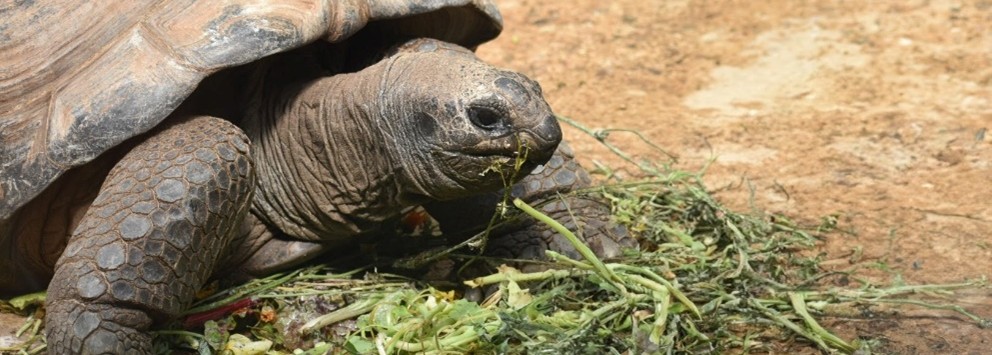We all feed our animals! It connects every animal collection. Whether a site has elephants, snails or even coral – they all have to eat. The great thing about this is that you’re never alone when it comes to challenges or developing feeding programmes. Let’s dive into what nutrition is and how it can make such a difference.
What is animal nutrition and why is it important in zoos and aquaria?
Approaches to animal nutrition can vary between zoos and aquaria, with responsibility often shared across keepers, curators, vets, and nutritionists. Regardless of structure, the goal remains the same: ensuring animals receive balanced, accessible nutrients to support health, growth, and reproduction. With proper nutrition, zoos and aquaria promote high standards of animal welfare while contributing to conservation goals by supporting species longevity and breeding success.
Nutrition is more than just sustenance. How animals interact with food also has a big impact. Developing feeding strategies that encourage natural behaviours and engage physical adaptations can improve physical and mental well-being, reduce stress, stereotypic behaviours, and enhance overall welfare.
Logistics also play a crucial role. Effective nutrition management requires maintaining food safety standards, sourcing sustainable, cost-effective ingredients, and aligning feeding practices with conservation goals.

Why have a Nutrition Working Group?
Nutrition is fundamental to animal health and welfare, influencing not just physical condition but also behaviour, reproduction, and longevity. However, achieving optimal nutrition can be complex—each species has unique dietary, behavioural, and ecological needs, which must be balanced with sustainability, availability, and financial constraints.
Many of these challenges are shared across sites, creating opportunities for collaboration. By working together, BIAZA institutions can benefit from collective expertise, shared resources, and practical solutions to improve standards across the wider zoo community. The Nutrition Working Group (NWG) exists to facilitate this collaboration, ensuring that nutrition knowledge and best practices are accessible to all BIAZA members.
How can the BIAZA Nutrition Working Group help?
The NWG is a collaborative team of animal nutritionists, keepers, nutritional leads, and researchers dedicated to advancing best practices across BIAZA zoos and aquariums. By working together, we share knowledge, work on care sheets, develop resources, and tackle emerging challenges in zoo nutrition, helping collections improve animal care through evidence-based approaches. The NWG can also help BIAZA members navigate logistical challenges by providing guidance on ethical sourcing, storage, and diet formulation.
To kick things off, we have our new Nutrition Resources document we would like to share with BIAZA members.
Get Involved!
The challenges of feeding animals in captivity can be big – but a problem shared is a problem halved. Keep an eye out for information shared on the BIAZA Research Facebook page; BIAZA Research Commitee. We will be introducing the individuals that make up the NWG group soon.
Please come and say hello at conferences and meetings, we love talking about food!
- BIAZA Nutrition Working Group
All blogs reflect the views of their author and are not necessarily a reflection of BIAZA's positions
-
News
.png?w=100&h=100&zc=1&f=jpeg&hash=a0b01e801771c24b4d7f5c3df4abed98) Twycross Zoo Welcomes Its First Baby of 2026: An Endangered Pileated Gibbon 19th February, 2026Conservation charity, Twycross Zoo, is celebrating a heart-warming milestone with the arrival of its first baby of 2026 - an endangered pileated gibbon,…
Twycross Zoo Welcomes Its First Baby of 2026: An Endangered Pileated Gibbon 19th February, 2026Conservation charity, Twycross Zoo, is celebrating a heart-warming milestone with the arrival of its first baby of 2026 - an endangered pileated gibbon,… -
News
.png?w=100&h=100&zc=1&f=jpeg&hash=c8eadb7dce959e1a8e6be51070cd0b3b) Conservation breeding success as Endangered spotted deer fawn is born at Bristol Zoo Project 19th February, 2026An extremely rare spotted deer fawn has been born at Bristol Zoo Project, marking another important conservation milestone for this Endangered species.…
Conservation breeding success as Endangered spotted deer fawn is born at Bristol Zoo Project 19th February, 2026An extremely rare spotted deer fawn has been born at Bristol Zoo Project, marking another important conservation milestone for this Endangered species.… -
News
.png?w=100&h=100&zc=1&f=jpeg&hash=60022dc0d0854fa23f80616d64c9376a) Sustainability in poetry - BIAZA Q&A with the author of The Rimba 17th February, 2026This week, BIAZA interviewed author Jane Griffiths and illustrator Emma Lokuciejewski on their recent book ‘The Rimba’ – a poetical…
Sustainability in poetry - BIAZA Q&A with the author of The Rimba 17th February, 2026This week, BIAZA interviewed author Jane Griffiths and illustrator Emma Lokuciejewski on their recent book ‘The Rimba’ – a poetical…

.png?w=100&h=50&zc=1&f=jpeg&hash=0e70fff8137d7d4924726911e605838b)

